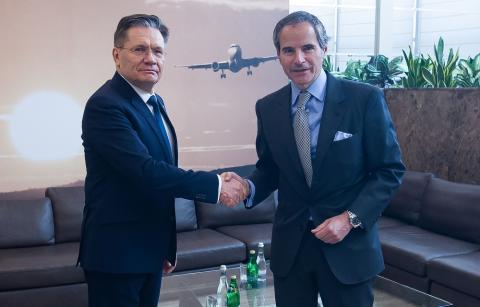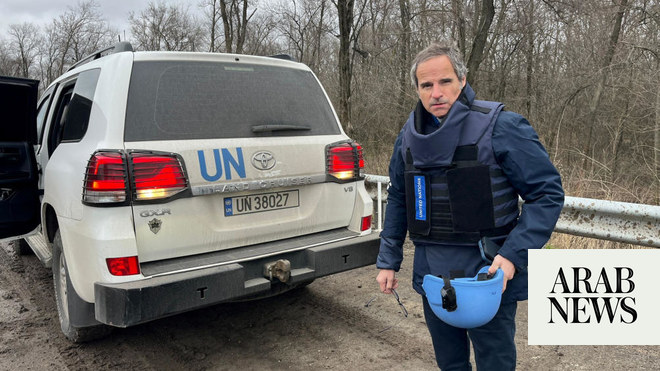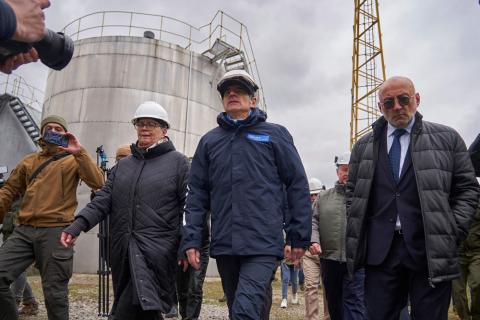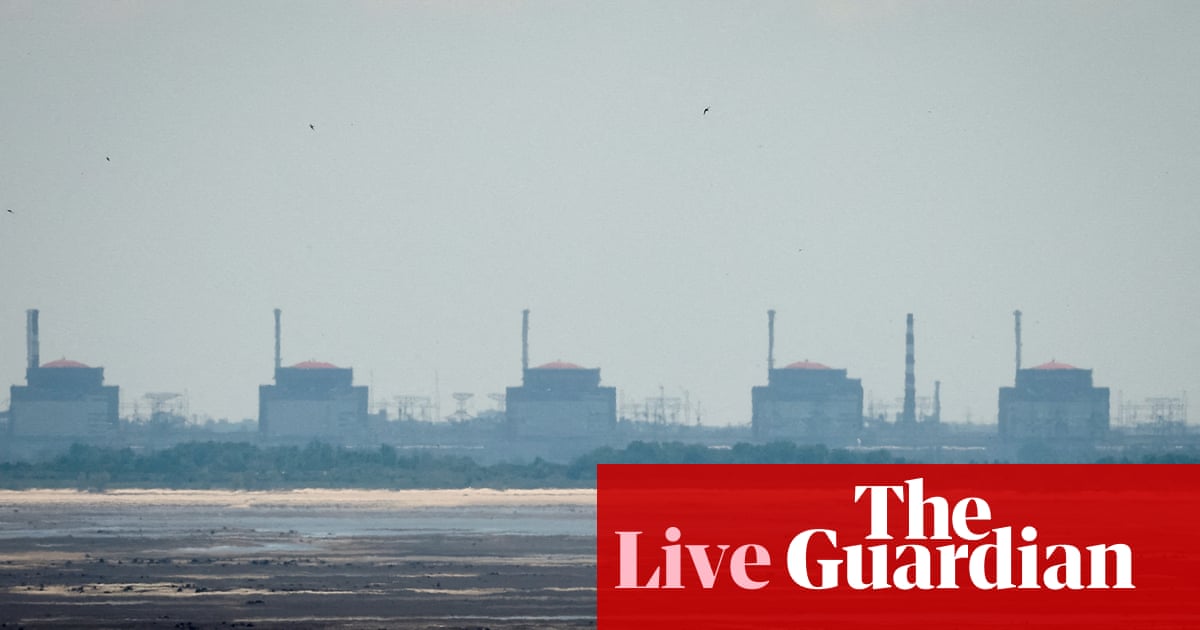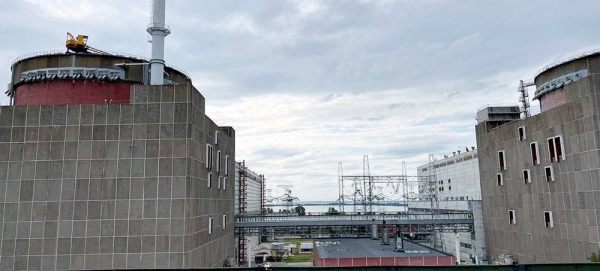
IAEA chief Rafael Grossi was due to brief the 15-member UN Security Council on the situation
Ukraine’s nuclear agency said Russian shelling of the Zaporizhzhia nuclear power plant has damaged “several radiation sensors“
LONDON: UN chief Antonio Guterres on Thursday called for military activity around Ukraine’s Zaporizhzhia nuclear power complex to end as Moscow and Kyiv blamed each other for a renewed shelling ahead of a UN Security Council meeting on the situation.
Russia seized Europe’s largest nuclear power plant in March after invading Ukraine on Feb. 24.
The plant is still run by its Ukrainian technicians and Ukraine’s Energoatom said the area was struck five times on Thursday, including near the site where radioactive materials are stored.
Guterres urged the withdrawal of military personnel and equipment and for no more forces or equipment to be deployed. He called for Russia and Ukraine not to target the facilities or surrounding area.
“The facility must not be used as part of any military operation. Instead, urgent agreement is needed at a technical level on a safe perimeter of demilitarization to ensure the safety of the area,” Guterres said in a statement.
The United States supports calls for a demilitarized zone around Zaporizhzhia, a State Department spokesperson said on Thursday.
Meanwhile, International Atomic Energy Agency (IAEA) chief Rafael Grossi was due to brief the 15-member UN Security Council on the situation later Thursday, at the request of Russia.
Russia’s Ambassador to International Organizations in Vienna, Mikhail Ulyanov, on Tuesday said that the IAEA was ready to visit Zaporizhzhia in June with Russia’s support.
“Unfortunately, at the very last moment the Department of Security of the UN Secretariat blocked the mission. We hope that the UN Secretary General will not allow this to happen again,” Ulyanov posted on Twitter.
UN spokesperson Stephane Dujarric said in response that the United Nations was committed to doing everything possible to get the IAEA technicians to Zaporizhzhia.
On Thursday, Ukraine’s nuclear agency said Russian shelling of the Zaporizhzhia nuclear power plant has damaged “several radiation sensors.”
Energoatom said the new strikes were close to one of the Russian-controlled Ukrainian plant’s six reactors and there was “extensive smoke,” adding that “several radiation sensors are damaged.”
Moreover, Ukraine aims to evacuate two thirds of residents from areas it controls in the eastern battleground region of Donetsk before winter, partly out of concern people won’t be able to stay warm amid war-damaged infrastructure, the deputy prime minister said on Thursday.
The government plans to evacuate some 220,000 people out of around 350,000, including 52,000 children, Iryna Vereshchuk told a news conference.
Late last month Ukraine announced the mandatory evacuation of people from Donetsk region, which has been the scene of fierce fighting with Russia, to save civilian lives.
Although the authorities describe the evacuation as “mandatory,” residents can opt out by filling in a form declaring their intention to stay.
Since Aug. 1, 3,904 people had been evacuated, Vereshchuk said.
She said thousands should leave before winter comes because the fighting has destroyed power and heating infrastructure.
She added that evacuation might have to expand to other war-hit areas, such as Kherson, Kharkiv and Zaporizhzhia regions.
Donetsk is part of the eastern region of Donbas, which Russia has said it aims to control completely.
In Copenhagen, a Ukraine donors’ conference of 26 countries pledged 1.5 billion euros (over $1.5 billion) more aid for training and equipment for Kyiv’s forces, the Danish defense minister said Thursday.
“All the participating nations here pledged for support, for training activities, demining activities, some with concrete donations,” Morten Bodskov said.
The exact amount promised by each of the 26 countries including France, Germany and the United States, was not published but Denmark announced a supplementary donation of $114 million for Ukraine, bringing its total support to Kyiv to $417 million.
Britain, which organized the conference with Denmark and Ukraine, promised nearly $300 million.
“Our partners know that we need funding and they articulated readiness to support us financially,” Ukrainian Defense Minister Oleksii Reznikov said as he welcomed the money.
The donors will meet again next month.
On the other hand, Estonia from next week will prevent most Russians from entering the country with visas issued by Estonian authorities, cutting off a popular route into Europe’s passport-free Schengen zone.
While exceptions apply, the Foreign Ministry for Estonia, a European Union member, said it will also cease to issue visas to Russians for work, study and business in the country.
The EU last month agreed a seventh round of sanctions against Russia since its invasion of Ukraine.
Ukrainian President Volodymyr Zelensky on Tuesday called on the West to impose a blanket travel ban on Russians in reaction to the ongoing war, an idea that angered Moscow.
The European Commission has questioned the feasibility of a blanket ban, saying certain categories such as family members, journalists and dissidents should always be granted visas.
(With AFP, AP and Reuters)




